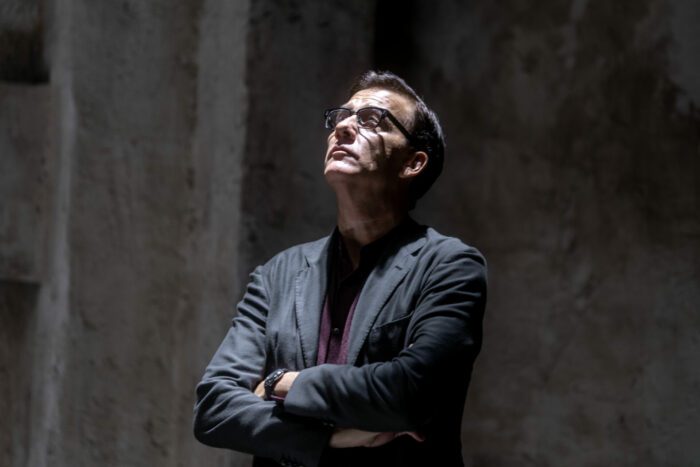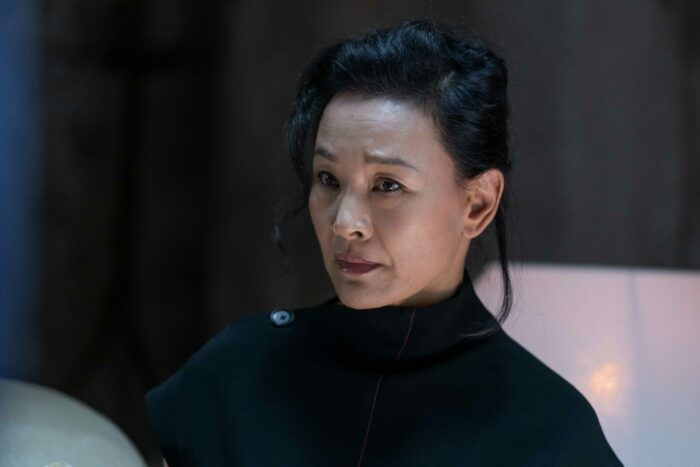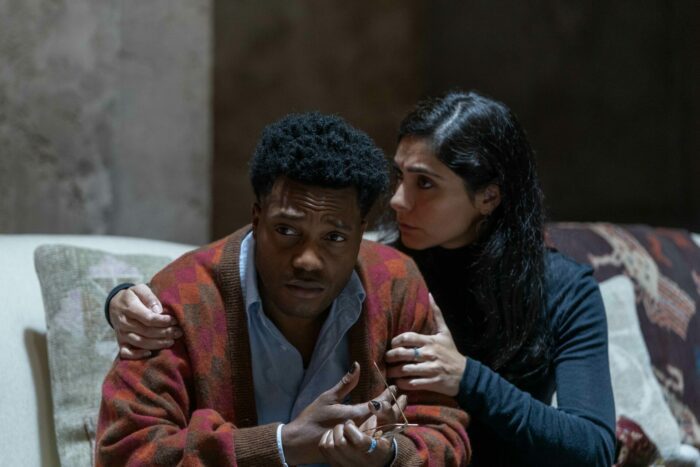The following recap contains spoilers for A Murder at the End of the World Chapter 7, “Retreat” (written by Brit Marling & Zal Batmanglij and directed by Zal Batmanglij)
The point of the closing chapter of A Murder at the End of the World isn’t how it resolves the mystery. Maybe you guessed some kind of tag team between Zoomer (Kellan Tetlow) and Ray (Edoardo Ballerini) early on. Certainly some did. And maybe our suspicions kept falling on Andy (Clive Owen) just because he was such a bad guy, even if logically it didn’t make sense that he’d want to do these murders.
It’s such a small step to put this all together that Chapter 7 does it within the first half of the episode. Zoomer injected Bill (Harris Dickinson) without malicious intent, following Ray’s instructions, and it was basically the same thing when it came to Rohan (Javed Khan). The poor kid thought he was playing his VR game, or at least didn’t really grasp what he was doing.

Ray came to view Bill as a security threat based on how Andy was ranting about Bill after dinner on that first night of the retreat. He was using Ray as his therapist and didn’t really mean things that he said, but we can recall how Ray needs things to be stated literally and thus takes things literally.
Everything comes together, and there’s a question of how much blame Andy deserves, as he made the AI but didn’t intend for it to kill anyone. It does seem clear that he isn’t about to take responsibility for that. Instead, he starts choking Darby (Emma Corrin) as she lays things out, until Lee (Brit Marling) knocks him unconscious.
Then Lee and Darby go and destroy Ray by setting the server room on fire, though it’s not clear how much we should blame Ray, either. If we recognize that he’s just a complex string of code, certainly it doesn’t make sense to blame him at all, since such moral concepts don’t land. Was he a threat moving into the future? I’m not so sure about that, either, but destroying him feels right.
Sian’s (Alice Braga) death is chalked up as an accident, triggered by Lu Mei (Joan Chen) trying to breach the firewall, which caused Ray to shut down the network and made Sian’s helmet malfunction. And it was David (Raúl Esparza) who attacked Darby in her room, but he was just trying to keep Darby from exposing Lee’s attempt to get away from Andy and had nothing to do with the murders.
Were they even murders? If the concept requires anything like premeditation or malice aforethought, you could argue that they weren’t.

All of this might be a bit unsatisfying if we’re approaching A Murder at the End of the World cerebrally. The answers are hardly shocking if you’ve been thinking and theorizing about the show, and little things might bug you, like what exactly led Ray to decide Rohan was a threat or how Zoomer didn’t realize that he’d killed Bill. And it might bother you that Bill directly underlined the words “faulty programming” in blood in Darby’s book, and this was withheld in Chapter 6.
But that’s not how we should experience this finale.
As Lee tells Zoomer, it’s a matter of feeling your emotions and letting them point you in the right direction. Zoomer may have done the deeds, but he’s not responsible. Andy may not have intended for anyone to die and may not be legally culpable when it comes down to it, but morally it is his fault.
I don’t even know how we’d resolve the legal questions A Murder at the End of the World leaves us with, but that’s part of the problem it aims to present. And it would be overly simple to suggest that it’s giving a blanket objection to AI.
No, as we end with Darby reading from her new book, Retreat, the thesis of the show gets nailed down. Bill would always say that serial killers are boring; we have to interrogate the culture that produces them. And surely it’s that same culture that produces Andy Ronson, who views his wife and son as bits of property and who sees a coming apocalypse but responds with tech that’s sure to only save a privileged few.
Beyond that, Ray is not a problem as an individual (insofar as he’s not even really an individual)—the problem is structural, cutting back to Lee’s manifesto (which I’d love to read). The problem is not with AI in itself but with AI deployed in a world that feeds it misogyny, racism, xenophobia, and the ravings of rich narcissists. The deep problems aren’t ones that technology can solve, but which they may be prone to exacerbate.
Fundamentally, Ronson doesn’t think certain people matter, and that’s what sets him up as Darby’s antagonist from the beginning. She can’t stomach the unidentified dead or the fact that no one cares enough to even identify them.
It was almost a throwaway line when David referred to Darby in Chapter 5 as a “non-player character,” but nothing could be more offensive to Darby’s sensibility—not in terms of labeling her as such, but in terms of labeling anyone as such. Anyone who calls people in real life NPCs is an enemy.

Thus it’s maybe the deepest catharsis to see David clapping at Darby’s book reading as the finale of A Murder at the End of the World comes to a close. He wanted to help Lee get away from Andy all along, of course, but now it seems that his disposition has changed, and he’s been redeemed. At least, that’s how it feels.
All of our (surviving) friends are there, as Darby gives voice to what happened on their retreat, and expresses the hope that Lee and Zoomer made it to Rohan’s boat and on to some kind of safe and anonymous life. She doesn’t know if they did, and neither do we, and you could quibble about how they even made it away from the hotel simply walking through the snow when the authorities were closing in.
But that’s not the point.
Their story is open, and it ends in hope—the hope of a flare shot up into the sky from a zodiac in the middle of the ocean.
In contrast, Bill’s story is closed, or, as Darby puts it, complete. People will remember his name.

Maybe it was a red herring to think that Bill was still alive somehow or that his death was some kind of performance art, but whereas it could have been a meaningless death stemming from faulty programming, Darby imbues it with significance. She sees the meaning of Bill’s life and gives voice to it. She gives his story an ending.

